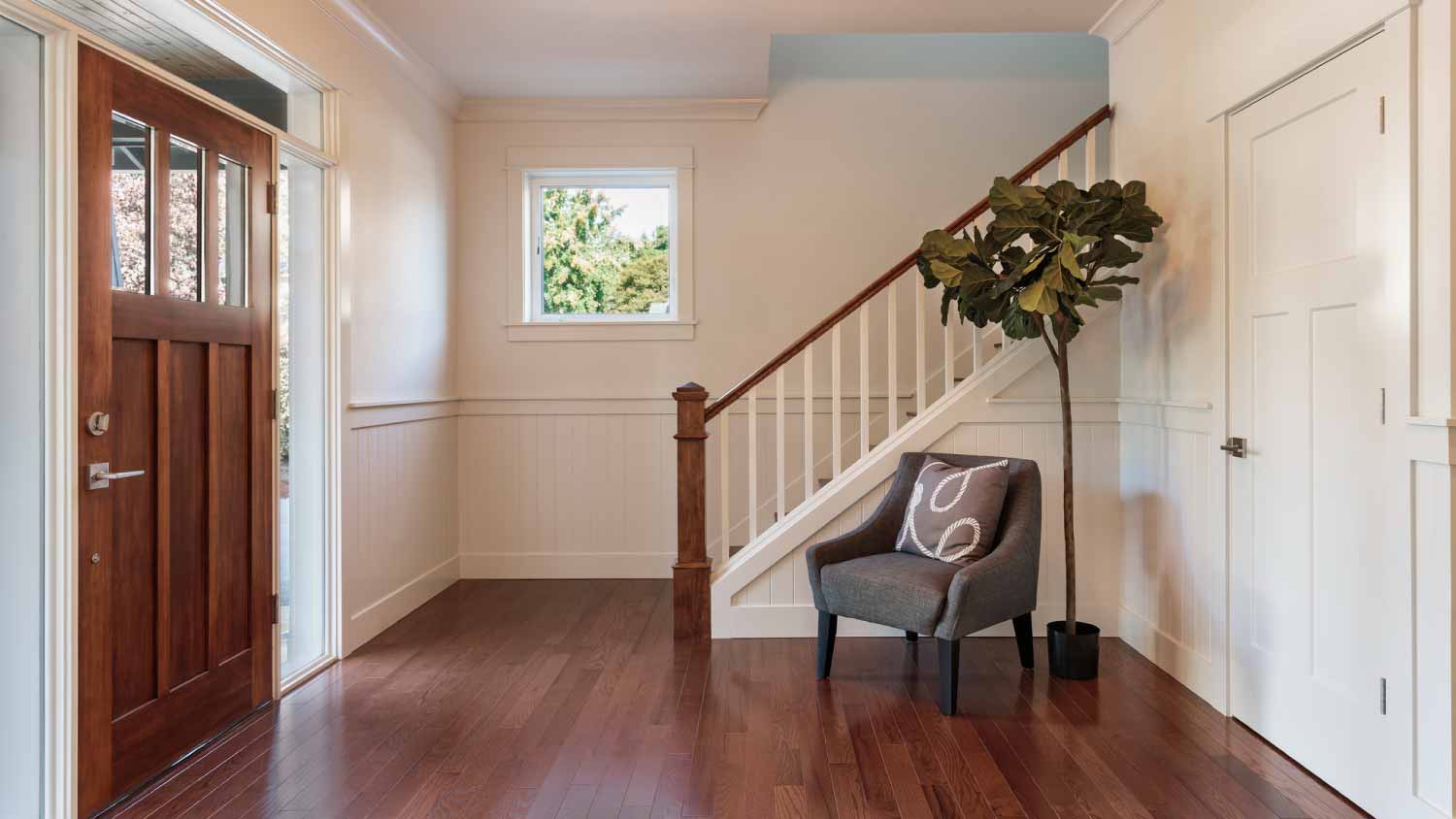How Long Does Tile Flooring Last?
Tile flooring can last a lifetime, depending on how you care for it


Tile flooring is any cut, tough flooring with grout in between each gap.
With proper care, tile flooring can last 50 years or longer.
Choosing tile meant for specific traffic patterns lengthens your tile’s life span.
Stone tile can last 100 years, but even properly-maintained ceramic tile can last for decades.
Tile flooring can be a hefty investment, so knowing how long tile flooring lasts is essential. The good news is tile flooring can last 75 to 100 years with proper care, but how long depends on many factors, including the amount of traffic the room gets and the chosen tile grade. Before choosing tile, it's essential to understand its intended use: Is it in a hallway with heavy foot traffic? A bedroom with soft and minimal traffic? Or just pretty tile adding a decorative touch under cabinets?
What Is Tile Flooring?
Tile flooring is an umbrella term for almost any flooring made of tiles, with grout filling the spaces in between. The most common types of tile flooring include ceramic and porcelain, but there are other options.
Tile flooring can take on almost any look, and most options are durable—but how much wear and tear tile can handle depends on its construction and grade. The key to maximizing tile’s durability is proper care. Even the most durable tile won't last as long as intended if you don't maintain its cleanliness, reseal the grout, and replace broken tiles.
6 Factors Affecting How Long Tile Flooring Lasts

If you’re in the market for durable tile flooring, it’s important to understand the factors that affect how long tiles last. Depending on the manufacturer and type of flooring, you may find tiles that last 50 years, sometimes longer.
Here are the factors affecting how long tile flooring lasts:
Tile Grade
Ceramic tiles have a tile grade between 1 to 3. Tiles with a grade of 1 or 2 are suitable for flooring, and tiles with a grade of 3 are meant only for walls, such as kitchen backsplashes or shower tiles. Grade 3 tiles are unsuitable for flooring and shouldn't be considered an option. Higher-grade ceramic tiles last longer but may increase the tile installation cost, so be sure to budget appropriately.
PEI Rating
The Porcelain Enamel Institute ranks ceramic and porcelain tiles on a scale of 1 to 5, giving them a PEI rating. However, unlike ceramic tile grade, the higher the PEI rating, the higher your chances of purchasing durable floor tiling.
When replacing tile flooring, look for tiles with a PEI rating of 3 or higher. Most residential uses do well with a PEI rating of 3, but areas with excessive traffic may consider a PEI of 4. Typically, level 5 PEI ratings are reserved for commercial use.
Traffic
The more traffic an area gets, the harder it is on the tile, cutting its life span short. If you’re installing tile in high-traffic areas like an entryway or a family room, focus on higher PEI-rated tiles.
Traffic increases the amount of dirt that accumulates and the level of abrasion on the flooring. If you’re installing the flooring in a high-traffic area, it’s important to know how to clean your floor tile’s grout to keep it in good condition.
Quick Repairs
Even durable tile flooring can crack or chip, but fast repairs can prevent the problem from spreading. When you budget for new tile flooring, include an extra 10% of tiles to keep on hand. If one tile cracks or breaks, you can replace it quickly. If you aren’t handy and need someone to help, look for a tile contractor near you.
Proper Sealing
Unglazed tile absorbs liquids, which can lead to stains and mold growth. When looking at the costs of installing a tile floor, include the cost of sealing it. Some tiles must be resealed periodically, so read the manufacturer's instructions and reseal the tile as suggested to increase your tile’s life span.
Cleanliness
Abrasion happens from normal wear and tear on tiles, but keeping the tiles clean can help. Dirt, grit, and tracked-in sand can cause your flooring to scratch and wear down, requiring premature replacement. Cleaning your floors often can lengthen their life span.
Types of Tile, Life Span, and Maintenance Tips

Every tile type has a different life span when properly handled. Here are the most common tile types and how to maintain them for the longest life span as flooring tiles.
| Tile Type | Average Life Span in Years |
|---|---|
| Ceramic | 75–100 |
| Porcelain | 60+ |
| Stone | Up to 100 |
Ceramic
Ceramic tiles are very popular because of their durability and easy care requirements. Glazed ceramic tiles are nonporous and stain-resistant, making them an excellent option for high-traffic areas.
With proper care, ceramic tiles can last 75 to 100 years, including resealing the grout annually in moderate traffic and less frequently in low-traffic areas. Immediately replace cracked ceramic tiles and keep the grout clean, which can be the most challenging part of maintaining ceramic tiles. However, if you don't maintain it, you'll need to learn how to regrout floor tile to keep it intact.
Porcelain
Porcelain and ceramic tiles often get confused, but they are two different types. Porcelain tile is a slightly more durable tile flooring because it's fired at a higher temperature, making it stain and scratch-resistant.
Like ceramic tiles, porcelain tiles can last 60 years or more with proper care. Keeping the grout clean is essential to keep the flooring long-term. Regularly resealing the grout-like ceramic tiles will lengthen the porcelain tile's life. Ceramic and porcelain tiles are usually good options for shower tile ideas.
Stone
Stone tiles are among the most durable tile flooring, lasting even longer than ceramic, sometimes as long as 100 years. Stone flooring stays cool even in the hottest temperatures and requires little maintenance.
However, stone flooring isn't waterproof and can easily damage when exposed to too much water. It is also prone to scratching and chipping, so it's not the best option for young families or households with pets.
All stone tile flooring requires regular sweeping or dust mopping and a gentle cleanser to keep up its appearance.

.jpg?impolicy=leadImage)



- Ceramic Tile Flooring Pros and Cons: Could This Be the Tile of Your Dreams?
- What Is the Best Tile for Bathroom Floors?
- What Types of Flooring Can Be Installed Over Ceramic Tile?
- Porcelain vs. Ceramic Tile: Which Is Best for Your Home?
- What Is the Best Tile for a Kitchen Floor?
- Standard Tile Sizes: Find the Best One for Your Tile Installation Project
- How to Dispose of Tile Properly
- Keep Your Tile Floors Clean With These 6 Tips
- What Is a PEI Rating? Uncovering the Secret to Choosing the Best Tile for Your Next Project
- 8 Tips for a Beautiful Tile-to-Wood Floor Transition










